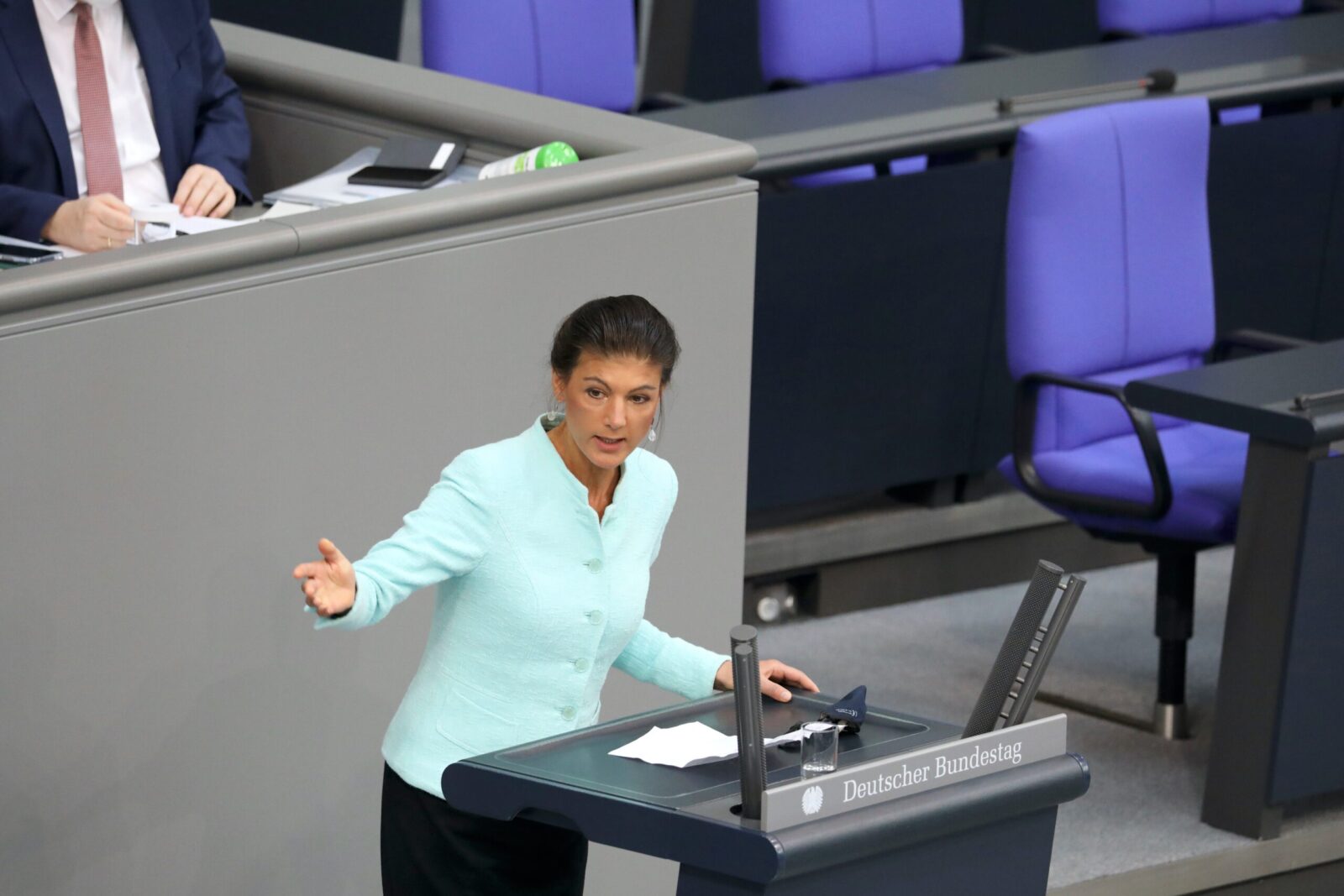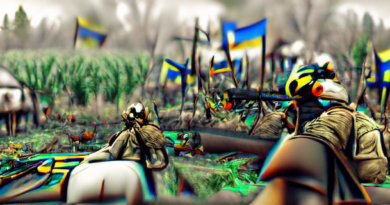The growing dangers of European radical populism for Europe and Ukraine
The populist challenge in Europe now appears everywhere across the continent. Questioning the continent’s liberal-democratic norms, these forces are particularly hostile to continued aid to Ukraine. Overall, it appears that several key personalities are leading the charge in this regard.
April 2, 2024 –
Joshua Kroeker
– 
Articles and Commentary

Sahra Wagenknecht during a speech on the introduction of mandatory corona vaccination in Germany. Photo: Jürgen Nowak / Shutterstock
A spectre is haunting Europe – the spectre of radical populism. All the powers of Europe are confronted with the unholy alliance of radical right and left ideologies, which threaten the very core of European democracy. Promising simplistic yet often impractical solutions to complex problems, populist movements across Europe – and the world – seek to push out the establishment in order to force divisive, corrupt and oftentimes radical ideological politics on society. For years now, their popularity has been growing, as have the dangers that accompany them.
European populist politics also carry real, immediate dangers for Ukraine. Propagating fallacious, ahistorical narratives about European security and Russia’s war against Ukraine, while at the same time downplaying and evening ignoring Russia’s threat to Europe’s collective security, these movements have created an echo chamber in which populists dismiss alternative explanations, fostering a demand for radical and oversimplified solutions. This includes proposals like cutting all funding to Ukraine, risking Russian occupation and harm to millions of Ukrainian civilians.
Unfortunately, populist politics extend from small local movements into the actions of current and potentially future heads of state. In a negative feedback loop, their actions have influenced the way in which Europe has responded to Russia’s threat, such as by hindering aid to Ukraine and delaying sanctions against Russia. This all represents a long-term trend threatening the future of European solidarity and an imminent danger to Ukraine’s chances at fighting off Russia’s invasion. To comprehend the gravity of these dangers, a closer examination of some of the key European figures is necessary.
Europe’s top five populists undermining Ukraine’s defence
Viktor Orban – Prime Minister of Hungary
Viktor Orban has been one of Europe’s loudest proponents of ending support to Ukraine. Often referred to as “Putin’s Cheerleader” or a derivative thereof, Orban and his government have again and again vetoed or stalled desperately needed European Union aid to Ukraine. Orban has railed against Ukraine for being “the most corrupt country in the world”, yet according to Transparency International’s Corruption Perceptions Index, Ukraine ranks 104, climbing over ten spots in the past year, whereas Russia has fallen to 141. At the same time, Hungary – topping the European Union for corruption – remains at 76. Moreover, Orban has refused to distance himself from Russia, often at the expense of Ukrainian nationhood. On February 11th, Orban stated in an interview that Ukraine should not be allowed to join the European Union, but rather that it should act as a “buffer zone” between Russia and Europe. In recent years, the European Union has blocked EU funds to Hungary for systemic rule-of-law violations and democratic backsliding. Orban, in seeking to hold the European Parliament hostage, has aligned himself both in rhetoric and policy with right-wing politicians globally such as Donald Trump, Brazil’s Bolsonaro, and – most frighteningly – Vladimir Putin.
Robert Fico – Prime Minister of Slovakia
Slovakia’s Robert Fico, a three-time prime minister of Slovakia and leftist politician, is often labelled as “pro-Russian” for his positive comments about Moscow and his anti-Ukraine stance. Though Fico has watered down his rhetoric since once again assuming the office of prime minister in October 2023 – even affirming support for Ukraine’s EU membership – Fico continues to call on Ukraine to give up territory to allow for an end to Russia’s invasion. Nevertheless, Fico has implemented a “not another bullet” policy in which he refuses to provide further aid for Ukraine and continues to claim he would veto Ukraine’s accession to NATO, claiming it would lead to a Third World War. Fico has also pushed a very anti-Ukraine, quasi-conspiracy narrative, claiming that “there is no war in Kyiv” and that “life there is absolutely normal,” despite constant Russian bombings of the city and the entire country – to which this author has been witness on multiple occasions. Though Fico has softened his tone, and his actions remain mostly in check, his fictitious narratives lend authority to the lies often spread about Ukraine by Europe’s populists.
Geert Wilders – Leader of the Dutch Party for Freedom (PVV)
Geert Wilders, the Netherlands’ prime minister elect, similarly pushed a very anti-Ukraine, pro-Russia narrative throughout his 2023 political campaign. Though his chances of becoming prime minister have weakened as he is unable to create a coalition strong enough to govern the country, he has repeatedly stated that he would end military and financial support for Ukraine and scale back sanctions on Russia. Should Wilders’ PVV party enter into some sort of a coalition, other coalition members are likely to dampen his party’s radical policies. Nevertheless, the damage has already been done, as Wilders has pushed Kremlin-like narratives about immigration, the war in Ukraine, western culture wars, and isolationism that can only benefit Russia. Though tough debates need to be had throughout all of Europe on the topics above, and traditionally underrepresented groups are looking towards leaders such as Wilders to do so, the rise of another right-wing populist in Europe could have existential consequences for Ukraine. Kremlin propagandists have loudly cheered on Wilders’ election victory, also pushing the narrative that he is a “supporter of Russia”. Upon gaining the most seats in the 2023 Dutch election, Viktor Orban congratulated Wilders, writing on Twitter “The winds of change are here!”
Alternative für Deutschland (AfD)
Germany’s AfD, a far right-wing populist party, has for over a decade challenged Germany’s post-Second World War trajectory through its propagation of ahistorical narratives and revisionism, anti-immigration rhetoric, and Russia-friendly policies. In January 2024 alone, members of the AfD were caught in a scandal following a “secret meeting” in Potsdam in which they discussed the “remigration” or expulsion of migrants from Germany. Germany’s Bundesamt für Verfassungsschutz – Berlin’s domestic intelligence agency – has labelled multiple members and wings of the AfD, such as its youth organization, “right-wing extremist”. In addition to the party’s radical tendencies, investigations show that AfD party staffers have had connections with and have passed information on to Russia’s intelligence agencies, all while seeking to prevent German arms deliveries to Ukraine. Other AfD politicians secretly travelled to Belarus and St. Petersburg in November 2022 and May 2023, respectively, while the founder of the AfD, Alexander Gauland, attended a Victory Day party at the residence of the Russian ambassador in Berlin in May 2023. The AfD, unlike some of Europe’s other populist parties, has not even tried to hide their support for Russia. In a 2022 interview, Alice Weidel, co-chair of the AfD, asserted that the primary casualty in the conflict was not Russia or Ukraine but Germany, criticizing the West for “endorsing Ukraine’s maximalist demands”, opposing any German intervention, and emphasizing that the implications for Ukraine, including the possibility of partition, were “not the AfD’s problem”. As the AfD’s influence continues to surge in Germany, the tangible threat of Ukraine losing backing from Europe’s most important economy becomes increasingly apparent.
Sahra Wagenknecht – Leader of the Sahra Wagenknecht Alliance
Last, but unfortunately not least, Sahra Wagenknecht could represent one of the most dangerous populist politicians for the future of democratic Europe. Formerly a member of the German Parliament for Die Linke, Germany’s left-wing party, Wagenknecht has been relatively successful in bringing together Germany’s radical left and radical right into one very loud – and populist – mass. On countless occasions, she has repeated the Kremlin’s narratives regarding its war against Ukraine, practically justifying it in the eyes of her followers. In the programme of her party, published in January 2024, Wagenknecht demands an end to sanctions against Russia, a cessation of EU accession negotiations for Ukraine, and a ceasefire in the Ukraine war – naturally aware of the millions living under the brutal, harrowing occupation regime in the territories under Russian control. She pushes an anti-NATO narrative, claiming that Russia invaded Ukraine to prevent it from joining NATO, a catch-all conspiracy theory that has again and again been debunked. Nevertheless, her adoring fans are often made up of conspiracy theorists, left and right-wing extremists, and followers of the Querdenker protest movement, who believe her false narratives that Germany is a “totalitarian state” and that the West does nothing but promote “warmongering”. All the while ignoring international law, the suffering of millions of Ukrainians, and Europe’s security, Wagenknecht has gained nearly five per cent of the German vote, according to the most recent electoral polls. Nevertheless, the silver lining lies in the fact that most of these votes are coming from the right-wing AfD and left-wing Die Linke, costing both of these parties valuable votes. Should Wagenknecht gain considerable traction, however, her party – and the narratives she employs – could pose a much greater problem for both Germany and Ukraine.
What this all means for Ukraine – and Europe
Glancing at almost any newspaper in recent months, it would appear that Europe is being overrun by populists. And while populism is undoubtedly on the rise, the composers of this discordant tune so far remain mostly divided, focusing primarily on internal, inward-looking issues. Nonetheless, each and every one of the individuals or parties mentioned above, as well as hundreds more in nearly every European country, have the ability to harm Ukraine’s chances at self-defence. Orban’s delaying of vital EU aid to Ukraine not only demonstrated cracks in the European Union’s unity, but it risked causing massive issues within the Ukrainian national budget and its ability to pay salaries, run infrastructure and prepare its continued defence. Should Geert Wilders take power in the Netherlands this year, the delivery of F-16 fighter jets promised to help Ukraine gain parity in the air would be called into question. However, for each individual case, democratic checks and balances prohibit how much damage one individual politician can do.
As the historical maxim reads, “strength is in unity.” That maxim, however, goes both ways. If Hungary’s Orban is correct that “the winds of change are here” and radical populists and extremists can unite, or at least cooperate, at the international or supranational levels, there is potential for the entire system to turn on Ukraine. As destructive as individual actions are, popular reception to ahistorical, fictitious and even malicious narratives and catch-all ideologies has – as we have seen many times over the past century – the potential to sabotage democratic processes, inflict self-harm on European institutions and security, and turn large portions of European societies against helping Ukraine. Should this come to pass, the atrocities that will take place throughout Russia’s reignited attempts to take Kyiv and occupy large swathes of Ukraine will far exceed those seen at the beginning of the war.
With the US Republican party blocking aid for Ukraine and former US President Donald Trump advocating against supporting Ukraine – and even stating that he would “encourage” Russia to invade NATO allies – the severity of guaranteeing European and by extension Ukrainian security has never been higher. As radical right-wing propagandists such as Tucker Carlson and Elon Musk seek evermore to push these dangerous, populist narratives, democratic governments, parties, industries and civilians need to push back. For the sake of western, European and Ukrainian security, are we up to the challenge?
Joshua R. Kroeker is an independent researcher, founder of the boutique analytic firm Reaktion Group, an analyst at the political analysis project R.Politik, and an editor at RANE. He holds degrees from the University of British Columbia in Canada, Heidelberg University in Germany and St Petersburg State University, Russia. @jrkroeker on Twitter.
Please support New Eastern Europe’s crowdfunding campaign. Donate by clicking on the button below.



